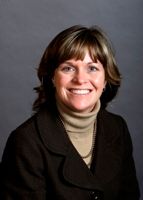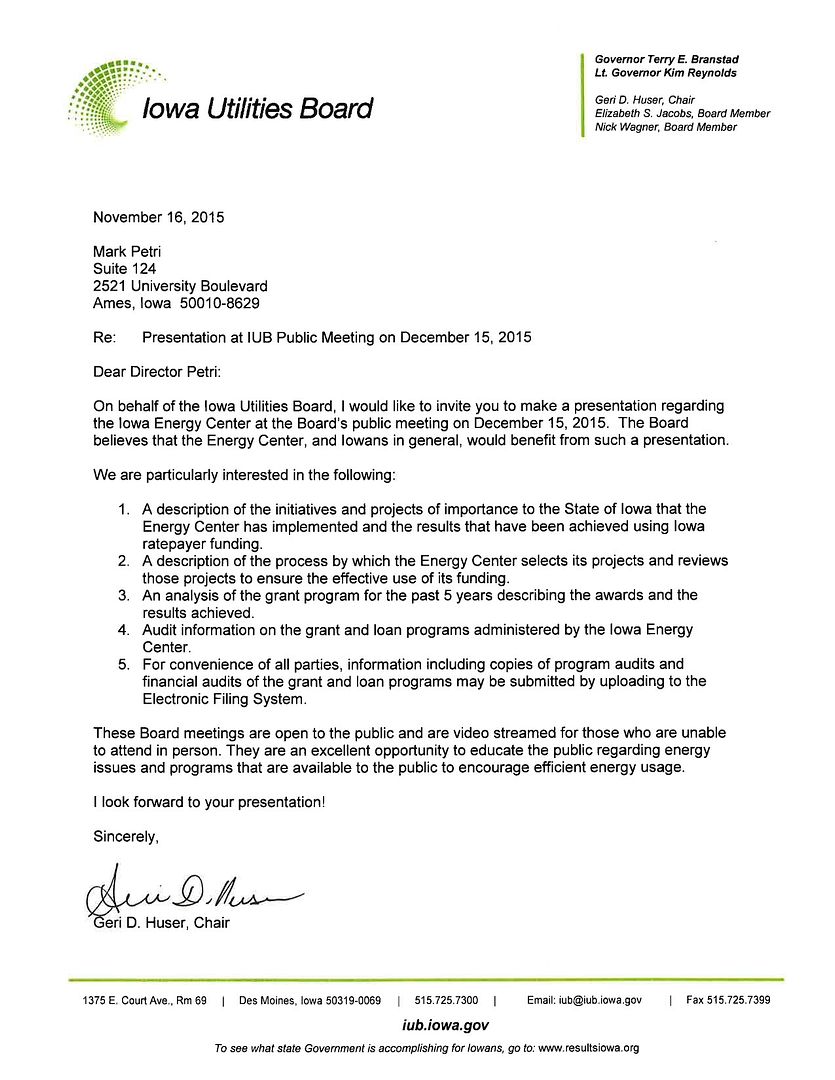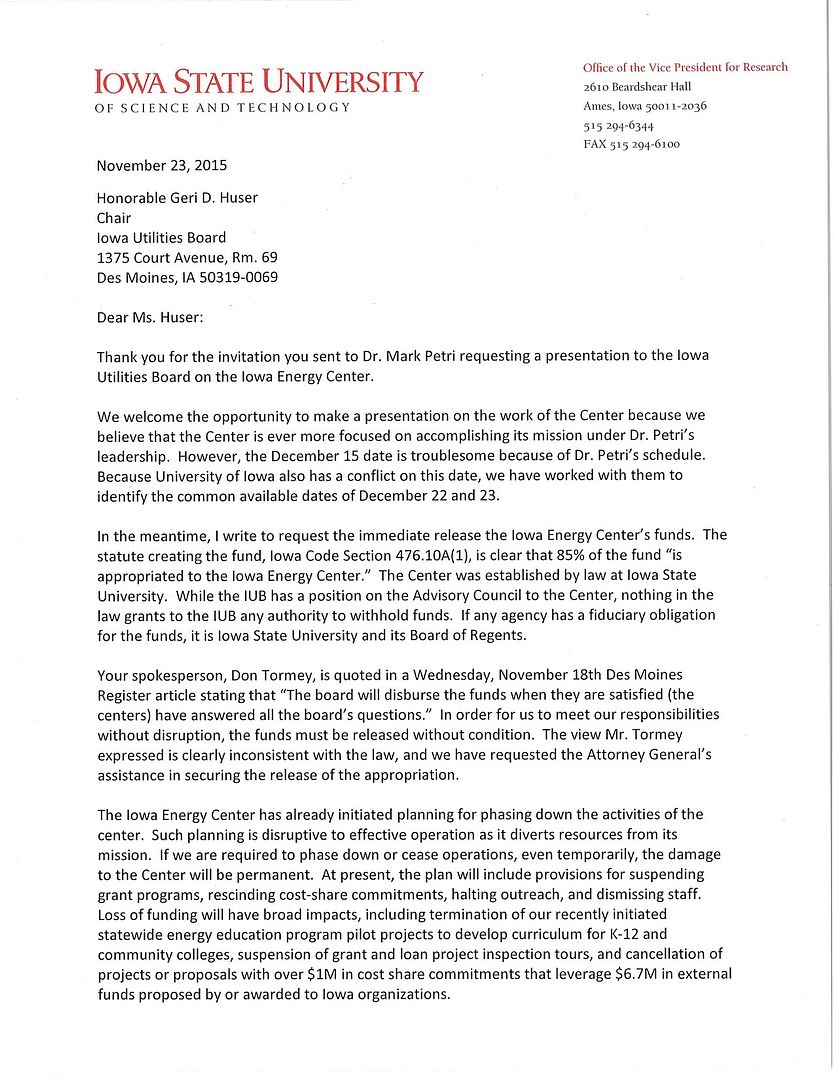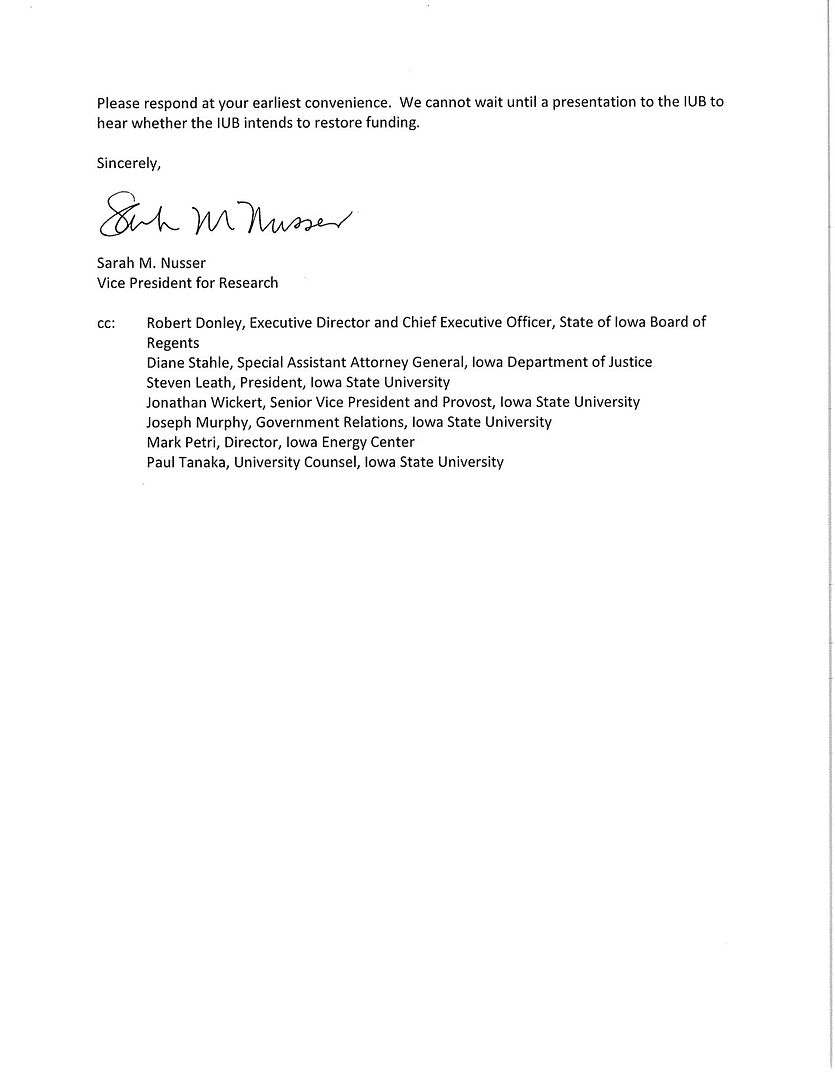The Iowa Utilities Board (IUB) announced yesterday that it “has started the process to transfer funds earmarked for the Iowa Energy Center (IEC) at Iowa State University and the Center for Global and Regional Environmental Research (CGRER) at the University of Iowa.” The retreat came less than a week after a spokesperson had insisted, “The board will disburse the funds when they are satisfied (the centers) have answered all the board’s questions.”
Restoring the flow of money means the centers charged with promoting alternative energy and efficiency and “interdisciplinary research on the many aspects of global environmental change” no longer face possible staff layoffs or program cuts. But yesterday’s climb-down won’t erase the damage done by IUB Chair Geri Huser’s unwise and unprecedented decision to withhold funding, in the absence of any legal authority to do so. She miscalculated in three ways.
The IUB never had the legal authority to back up Huser’s power play.
Huser is the only licensed attorney among the three former state legislators who currently serve as IUB members. She should have known that state law did not support her decision to withhold funds the board is supposed to pass on to the energy centers. Foley’s original report quoted Huser as claiming a “fiduciary responsibility” to scrutinize the center’s finances as a member of its advisory council: “Asked about her authority, she pointed to ‘a little chart (on the energy center’s website) that says the IUB provides the oversight.'”
Bleeding Heartland posted that chart and relevant portions of Iowa Code here. The chart places the IUB’s “oversight” next to “Gas & Electric Utilities,” not in the area depicting revenue transfers. Even to a non-lawyer, the plain intent of the language in Iowa Code is for the IUB to collect one-tenth of 1 percent of the investor-owned utilities’ total gross operating revenues during the past year, forwarding 85 percent of that money to the Iowa Energy Center and 15 percent to the Center for Global and Regional Environmental Research.
Foley’s November 23 report cited a “strongly worded letter” from Iowa State University’s Vice President for Research Sarah Nusser to Huser. I enclose the full text at the end of this post. Excerpt:
I write to request the immediate release [of] the Iowa Energy Center’s funds. The statute creating the fund, Iowa Code Section 476.10A(1), is clear that 85% of the fund “is appropriated to the Iowa Energy Center.” The Center was established by law at Iowa State University. While the IUB has a position on the Advisory Council to the Center, nothing in the law grants to the IUB any authority to withhold funds. If any agency has a fiduciary obligation for the funds, it is Iowa State University and its Board of Regents.
Your spokesperson, Don Tormey, is quoted in a Wednesday, November 18th Des Moines Register article stating that “The board will disburse the funds when they are satisfied (the centers) have answered all the board’s questions.” In order for us to meet our responsibilities without disruption, the funds must be released without condition. The view Mr. Tormey expressed is clearly inconsistent with the law, and we have requested the Attorney General’s assistance in securing the release of the appropriation.
Foley quoted the Attorney General’s office as saying on November 20 that funds for the energy centers “should be transferred … in a manner that permits the entities to carry out their respective missions, as established by law.”
I sought further details about the attorney general’s determination that the IUB lacked the authority to withhold funding as leverage for obtaining financial information. After emphasizing that the Attorney General’s office does not represent the utilities board, communications director Geoff Greenwood confirmed, “Last week an attorney in our office contacted the IUB attorney via telephone, following an AP inquiry to our office.” Greenwood provided the same statement he sent to Foley:
Iowa law provides permanent, standing appropriations to the Iowa Energy Center created in Iowa Code section 266.39C and the Center for Global and Regional Environmental Research established by the Board of Regents. The amounts appropriated should be transferred to these entities in a manner that permits the entities to carry out their respective missions, as established by law.
The IUB announced plans to transfer the funds within hours of Iowa State sending Nusser’s letter, though Tormey told Foley that Huser hadn’t seen the letter. Tormey added that “the board agreed with the attorney general’s position and would transfer the money when appropriate.” But the statement IUB released late yesterday afternoon appears to cling to some justification for delaying the funds. I’ll get to the full text shortly, but for now I’m interested in this passage (emphasis added):
Funding for the two centers comes from Iowa Code 476.10A which requires the Board to direct all natural gas and electric utilities to remit to the treasurer of the state, one-tenth of one percent of the total gross operating revenues during the last calendar year derived from their intrastate public utility operations. These assessments come from Iowa utility ratepayers, whose interests the Board is required by statute to consider in its regulatory role.
Dude, when you’re in a hole, stop digging. The IUB regulates gas and electric utilities on behalf of ratepayers. Its jurisdiction in this area does not confer any power to decide when or whether to forward funds to the energy centers. Former State Representative David Osterberg, who helped write the law in question, told Foley last week, “We never intended for IUB to do anything more than pass the money on.”
Don’t take his word for it. Someone from the Attorney General’s office told the IUB’s attorney that the board was out of line. Do you know how rare it is for the Attorney General’s office not to back up a state agency’s legal reasoning? We’re talking about the people who defended:
• Governor Terry Branstad’s attempt to veto language governing the use of appropriated funds without vetoing the money in question (later struck down by a unanimous Iowa Supreme Court)
• The Iowa Department of Public Health’s refusal to put non-birthing spouses’ names on birth certificates for children of same-sex married couples (later struck down by a unanimous Iowa Supreme Court)
• The Iowa Department of Public Health’s refusal to put non-birthing spouses’ names on death certificates for children of same-sex married couples (later ruled discriminatory by a Polk County District Court)
• Secretary of State Matt Schultz’s use of emergency rule-making to strike suspected non-citizens from voter rolls (later blocked by a Polk County District Court’s temporary injunction)
• Secretary of State Schultz’s use of regular rule-making to establish procedures for purging voter rolls (later blocked by a Polk County District Court ruling that Schultz “lacked the statutory authority”)
• The Iowa Board of Medicine’s rule banning the use of telemedicine for one medical procedure only, in the absence of evidence showing health risks associated with such care (later struck down by a unanimous Iowa Supreme Court).
Exceeding your legal authority is a big mistake for someone to make in her first year chairing a state board. Nor was that Huser’s only blunder.
The IUB needlessly escalated a conflict.
Commenting on last week’s post about Huser’s overreach, one Bleeding Heartland reader privately suggested I should give Huser the benefit of the doubt. The message got me thinking: maybe she wasn’t applying strong-arm tactics in the service of some unknown agenda. Maybe she had legitimate concerns about the energy centers’ management. Maybe she tried to get information through normal channels but had been rebuffed. Maybe she felt holding up the funds was her only way to get the director’s attention. Such motives would not excuse her illegal behavior but could explain it.
Huser and IUB spokesperson Tormey have constructed a narrative in which the IUB chair was battling a culture of secrecy at the energy centers.
I have not seen evidence supporting that version of events.
Foley’s initial report for AP on November 16 paraphrased Huser as saying she was seeking “detailed information about [the Iowa Energy Center’s] grant and loan programs.” That story included the following passage:
At her first [Iowa Energy Center advisory council] meeting in May, Huser said the council adopted her motion asking the center to set aside money to conduct program audits.
At a meeting this month, Huser said she learned the center was instead planning to undergo an internal and external review, which wasn’t what she had in mind.
The advisory council’s meeting took place on November 3. For more than two decades, the IUB has routinely transferred funds to the energy centers around mid-September. Huser’s disappointment upon learning the center was planning reviews rather than “program audits” can’t explain why she chose not to follow the usual schedule for releasing those funds.
Yesterday’s IUB press release painted a picture of board members frustrated by lack of disclosure from the energy centers. From that November 23 statement (emphasis added):
Iowa Utilities Board seeks improved transparency over utility ratepayer-funds
(Des Moines) – The Iowa Utilities Board has started the process to transfer funds earmarked for the Iowa Energy Center (IEC) at Iowa State University and the Center for Global and Regional Environmental Research (CGRER) at the University of Iowa while continuing to pursue an open and public dialogue with the Centers regarding the transparency of their programs.
As a member of the IEC Advisory Council, the Board’s continued concern in this matter is ensuring transparency in the awarding and oversight of the IEC’s utility ratepayer-funded programs. The Center has repeatedly failed to provide information to the Board when requests were made. In order to better inform and educate the public the Board recently sent letters inviting both the IEC and CGRER to make a presentation to the Board regarding these utility customer-funded programs, at the Board’s December 15, 2015, public Board meeting. In addition, the Board will continue to work with the IEC Advisory Council to ensure adequate program audits are performed.
Funding for the two centers comes from Iowa Code 476.10A which requires the Board to direct all natural gas and electric utilities to remit to the treasurer of the state, one-tenth of one percent of the total gross operating revenues during the last calendar year derived from their intrastate public utility operations. These assessments come from Iowa utility ratepayers, whose interests the Board is required by statute to consider in its regulatory role.
The Board is the billing/collection center for this assessment pursuant to the Board’s authority under Iowa Code section 476.10A. The Board will transfer eighty-five percent of the total funds collected ($4,375,566) to Iowa State University for the Iowa Energy Center. The Board will transfer fifteen percent of the funds collected ($772,159) to the University of Iowa for the CGRER. The total assessment collected was $5,147,725.
A Board representative is also appointed to serve as one of the 13 members of the Iowa Energy Center Advisory Council established in Iowa Code Section 266.39C. […]
The role of the Advisory Council, specified in Iowa Code, is to advise the director of the IEC in the development of a budget and on the policies and procedures of the center in the funding of research grant proposals and regarding program planning and review. During the past few years, the various Board representatives to the Advisory Council together with other Council members have repeatedly discussed the need for more detailed information from the IEC related to the Center’s budgets and programs.
It would have been helpful for the IUB to produce other documents attesting to board members’ concerns about the Iowa Energy Center. Iowa State University spokesperson John McCarroll told Foley yesterday that “center administrators ‘don’t know what the IUB is referring to'” when asserting that information requests from the IUB had “repeatedly” been ignored.
Iowa State officials also provided this timeline, which paints a picture of energy center officials baffled by the funding delay and Huser not responding to their repeated “requests for information.”
Summary of ISU requests for information to IUB
IEC [Iowa Energy Center] Interactions
10/19/2015 Marty Watt (IEC) requests anticipated transfer date from Alice Blalock (IUB). No response received.
10/23/2015 Petri calls Blalock. Blalock indicates that funds have been collected, paper work is completed, but there is an issue that Petri should contact Geri Huser (IUB) about.
10/26/2105 Petri calls Huser, left a message with receptionist for Huser to contact Petri.
10/30/2015 Petri emails asking Huser to contact Petri.
11/03/2015 Huser attends the Iowa Energy Center’s fall Advisory Council meeting, but has no discussion with the IEC regarding the anticipated funding transfer date outside of the open meeting.
ISU VPR [vice president for research] Interactions
11/15/2015, eve Sarah Nusser (ISU VPR) emails Geri Huser (IUB) asking for a phone conversation.
11/16/2015, morn Nusser leaves a message in Huser’s voicemail. Nusser talks to and leaves a message with IUB receptionist. No response.
11/16/2015, eve After reading news accounts, Nusser emails Huser requesting a meeting in near future on questions that she has, as noted in press reports. Nusser reminds Huser that the IEC program review/audit is planned, per Advisory Council discussions, but will take some time to complete.
11/17/2015, morn Nusser leaves a message with IUB receptionist requesting a meeting on Friday. Receptionist will send to Huser’s assistant.
11/18/2015 Huser’s assistant calls Nusser to schedule an appointment. Nusser suggests a visit that ends by 2:30 or a phone call before 3:30 on Friday, Nov 20. Assistant is unsure about best time, and suggests Dec 11. Nusser suggests that it is important to get questions resolved in near term. Assistant agrees to check with Huser and get back to Nusser.
Assistant calls back to suggest Dec 4. Nusser reiterates the urgency to resolve the questions that Huser has, and requests an earlier meeting date, phone conversation or an email communication that lays out Huser’s questions.**** In response to Nusser request to meet with Chair Huser, IUB asked Nusser to report to the IUB, rather than have a 1-1 conversation, which Nusser declined. And then this weekend (11/21/2015), IUB wanted a Monday meeting (11/23/2015) that included attoneys – our schedules did not permit that meeting to occur and IUB has not reached back.
ISU Counsel interactions
11/16/2015 Paul Tanaka (ISU Counsel) calls David Lynch (IUB General Counsel).
11/17/2015 Lynch returns call. Tanaka shares his own interpretation of statute, the implication that IUB may withhold funds if not satisfied with December presentation, Huser’s interpretation that IUB has a fiduciary obligation for the funds, and that he has asked the AG to coordinate advice on the issue and the appropriateness of the funds going through IUB.
I’m not surprised Huser was hard to reach by phone or e-mail. Work related to the proposed Dakota Access (Bakken) pipeline has consumed the IUB’s attention lately. Most business days since November 12, Huser has been tied up listening to public comments or presentations at evidentiary hearings on the pipeline.
The IUB didn’t share with the media any paper trail showing that Huser or her predecessors representing the IUB on the energy center’s advisory council had sought more financial information. The only letters linked in the press release were from Huser to the two energy center directors, dated November 16–the same day Foley filed his first AP story on the controversy. That article noted,
In a letter Monday [November 16] to the [Iowa Energy] center’s executive director, Mark Petri, she requested that he make a presentation on Dec. 15 detailing how projects are selected and an analysis of results achieved in the past five years. She also requested “copies of program audits and financial audits,” but didn’t mention the center’s funding.
Foley’s description doesn’t convey the dissonance between the tone of Huser’s communication and what was occurring in the power relationship between the IUB and the centers at the time. The word “surreal” is overused, but I don’t know a better way to describe this letter to Petri. The corresponding message to Center for Global and Regional Environmental Research director Greg Carmichael was nearly identical in tone and content.
Reading that letter without knowing the context, you’d never guess Huser had Petri in a fiscal choke hold. You’d never guess he and his colleagues had been trying for weeks to find out why the center’s funds had been held up. You’d never guess the center’s ability to keep functioning would depend on whether Huser and fellow board members were satisfied with what Petri presented to them on December 15.
So many friendly phrases: “I would like to invite you”; “an excellent opportunity to educate the public regarding energy issues and programs”; “I look forward to your presentation!” After reading the IUB’s November 23 press release, I would have expected some language along the lines of, “As we have requested on [dates of past communications],” or “As the board has mentioned in previous correspondence, we are particularly interested in,” or even, “The board will disburse the center’s operating funds once you have provided the following information […].”
If Huser tried and failed to obtain financial details from the energy centers before she took it upon herself to hold up funding in September, the IUB should release the proof. Based on what the board has made available to date, I still don’t understand why Huser would go to such extraordinary lengths to disrupt activities at the energy centers.
This debacle comes at a bad time for the Iowa Utilities Board.
Outside energy and environmental policy wonk circles, few Iowans are aware of the utilities board’s existence. It rarely receives much media coverage, even when its decisions affect thousands of people. A 2009 IUB ruling on ratemaking principles wasn’t headline news for most of the Iowa press corps. Yet that decision prompted an investor-owned utility to drop plans for a new coal-fired power plant in Marshalltown. Such a facility would have triggered respiratory problems, heart attacks, and strokes among Iowans living downwind for decades.
This month, the IUB has been listening to comments from parties interested in the Bakken pipeline project. Those hearings are scheduled to continue for at least another two weeks. Sometime early next year, board members will decide whether to approve the use of eminent domain to seize land for the pipeline.
The Bakken decision will focus more media attention on the IUB than this obscure state agency has received in years. The pipeline evokes strong feelings among proponents, who see it as a vital jobs program, and detractors, who are concerned about the implications for Iowa soil, water quality, and property rights. Litigation is expected, regardless of how the board decides the eminent domain question.
Not long before the IUB’s actions are guaranteed to receive an unusual level of scrutiny, Huser has made the board look heavy-handed and ill-informed about its legal authority.
Any relevant comments are welcome in this thread.
UPDATE: The Des Moines Register’s lead editorial on November 28 argued that “The Iowa Utilities Board overstepped its authority.”
There’s a certain irony here that Huser seems to have missed: She’s claiming her inquiries are motivated by a desire to safeguard the money that’s collected from utility customers. But by holding the money hostage until certain questions could be answered, the board misused those funds, and it did so in violation of Iowa law.
Gov. Terry Branstad’s appointment of Huser to the board was widely viewed as an attempt to appease the utilities the board is charged with overseeing. Is she now doing the bidding of the utilities by scrutinizing the centers and their work on alternative sources of energy? She says she is not. Mike Fehr, an executive with MidAmerican Energy, told the AP that all Huser is “trying to do is make sure the money collected for the Iowa Energy Center is spent in a responsible way.”
Well, that’s not the job of the utilities board. In fact, it could easily be argued that the board, as a regulator of Iowa’s utility companies, would have a conflict of interest in attempting to exert influence over the manner in which the two state universities study climate change and promote the use of wind, solar and biomass energy.
Spending at the two centers is overseen by the universities. In the future, unless there’s evidence the universities aren’t up to the task, the Iowa Utilities Board should immediately provide the centers with all of the the money that’s collected on their behalf.




